Aristotle vs Kant: Exploring Similarities in Moral Goodness Theories
VerifiedAdded on 2020/05/28
|9
|2545
|430
Essay
AI Summary
This essay provides a comparative analysis of the moral philosophies of Aristotle and Kant, two influential figures in the history of ethics. It examines their distinct approaches to moral goodness, exploring Aristotle's emphasis on virtuous behavior and the pursuit of eudaimonia through the development of good habits, and Kant's focus on the categorical imperative and the importance of duty and rational will. The essay highlights the key similarities between their theories, such as their shared goal of achieving a virtuous and happy society through ethical decision-making, and their emphasis on the practical application of moral principles. It also delves into the nuances of their respective concepts, including Aristotle's balance between extremes and Kant's concept of duty, and how these concepts influence their understanding of moral actions. Ultimately, the essay demonstrates that despite their different frameworks, both philosophers sought to establish a framework for ethical conduct that would lead to individual fulfillment and a flourishing society. The essay is contributed by a student to be published on the website Desklib.
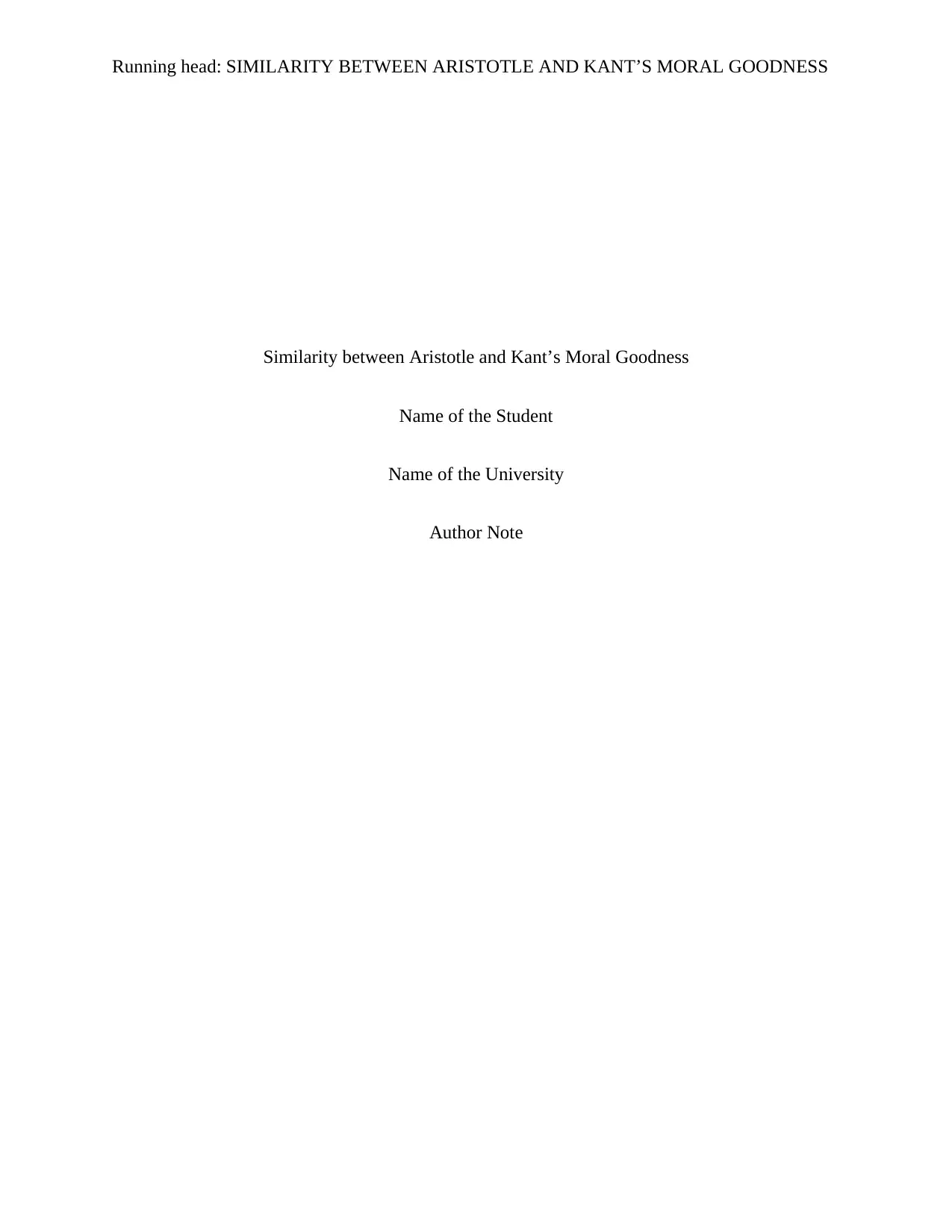
Running head: SIMILARITY BETWEEN ARISTOTLE AND KANT’S MORAL GOODNESS
Similarity between Aristotle and Kant’s Moral Goodness
Name of the Student
Name of the University
Author Note
Similarity between Aristotle and Kant’s Moral Goodness
Name of the Student
Name of the University
Author Note
Paraphrase This Document
Need a fresh take? Get an instant paraphrase of this document with our AI Paraphraser
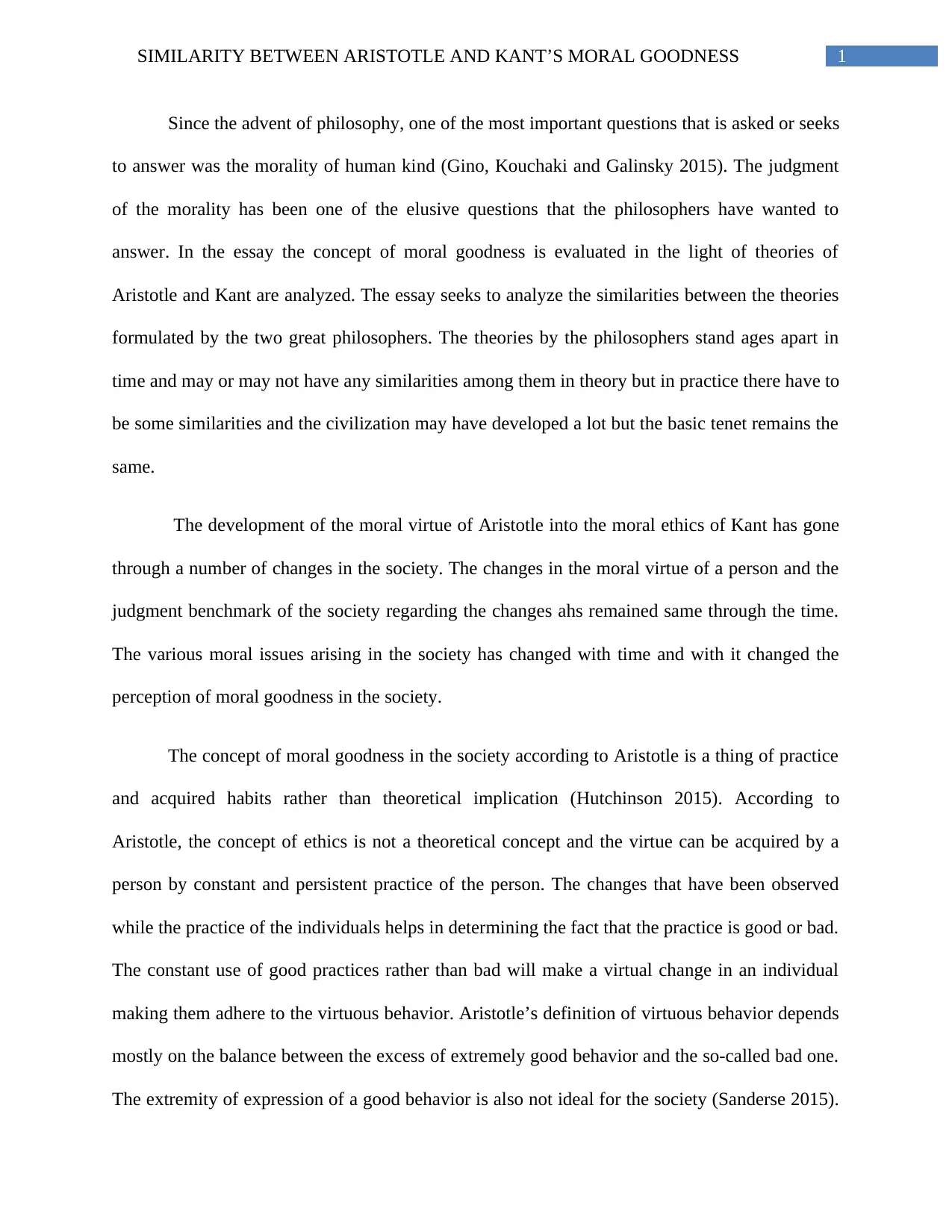
1SIMILARITY BETWEEN ARISTOTLE AND KANT’S MORAL GOODNESS
Since the advent of philosophy, one of the most important questions that is asked or seeks
to answer was the morality of human kind (Gino, Kouchaki and Galinsky 2015). The judgment
of the morality has been one of the elusive questions that the philosophers have wanted to
answer. In the essay the concept of moral goodness is evaluated in the light of theories of
Aristotle and Kant are analyzed. The essay seeks to analyze the similarities between the theories
formulated by the two great philosophers. The theories by the philosophers stand ages apart in
time and may or may not have any similarities among them in theory but in practice there have to
be some similarities and the civilization may have developed a lot but the basic tenet remains the
same.
The development of the moral virtue of Aristotle into the moral ethics of Kant has gone
through a number of changes in the society. The changes in the moral virtue of a person and the
judgment benchmark of the society regarding the changes ahs remained same through the time.
The various moral issues arising in the society has changed with time and with it changed the
perception of moral goodness in the society.
The concept of moral goodness in the society according to Aristotle is a thing of practice
and acquired habits rather than theoretical implication (Hutchinson 2015). According to
Aristotle, the concept of ethics is not a theoretical concept and the virtue can be acquired by a
person by constant and persistent practice of the person. The changes that have been observed
while the practice of the individuals helps in determining the fact that the practice is good or bad.
The constant use of good practices rather than bad will make a virtual change in an individual
making them adhere to the virtuous behavior. Aristotle’s definition of virtuous behavior depends
mostly on the balance between the excess of extremely good behavior and the so-called bad one.
The extremity of expression of a good behavior is also not ideal for the society (Sanderse 2015).
Since the advent of philosophy, one of the most important questions that is asked or seeks
to answer was the morality of human kind (Gino, Kouchaki and Galinsky 2015). The judgment
of the morality has been one of the elusive questions that the philosophers have wanted to
answer. In the essay the concept of moral goodness is evaluated in the light of theories of
Aristotle and Kant are analyzed. The essay seeks to analyze the similarities between the theories
formulated by the two great philosophers. The theories by the philosophers stand ages apart in
time and may or may not have any similarities among them in theory but in practice there have to
be some similarities and the civilization may have developed a lot but the basic tenet remains the
same.
The development of the moral virtue of Aristotle into the moral ethics of Kant has gone
through a number of changes in the society. The changes in the moral virtue of a person and the
judgment benchmark of the society regarding the changes ahs remained same through the time.
The various moral issues arising in the society has changed with time and with it changed the
perception of moral goodness in the society.
The concept of moral goodness in the society according to Aristotle is a thing of practice
and acquired habits rather than theoretical implication (Hutchinson 2015). According to
Aristotle, the concept of ethics is not a theoretical concept and the virtue can be acquired by a
person by constant and persistent practice of the person. The changes that have been observed
while the practice of the individuals helps in determining the fact that the practice is good or bad.
The constant use of good practices rather than bad will make a virtual change in an individual
making them adhere to the virtuous behavior. Aristotle’s definition of virtuous behavior depends
mostly on the balance between the excess of extremely good behavior and the so-called bad one.
The extremity of expression of a good behavior is also not ideal for the society (Sanderse 2015).
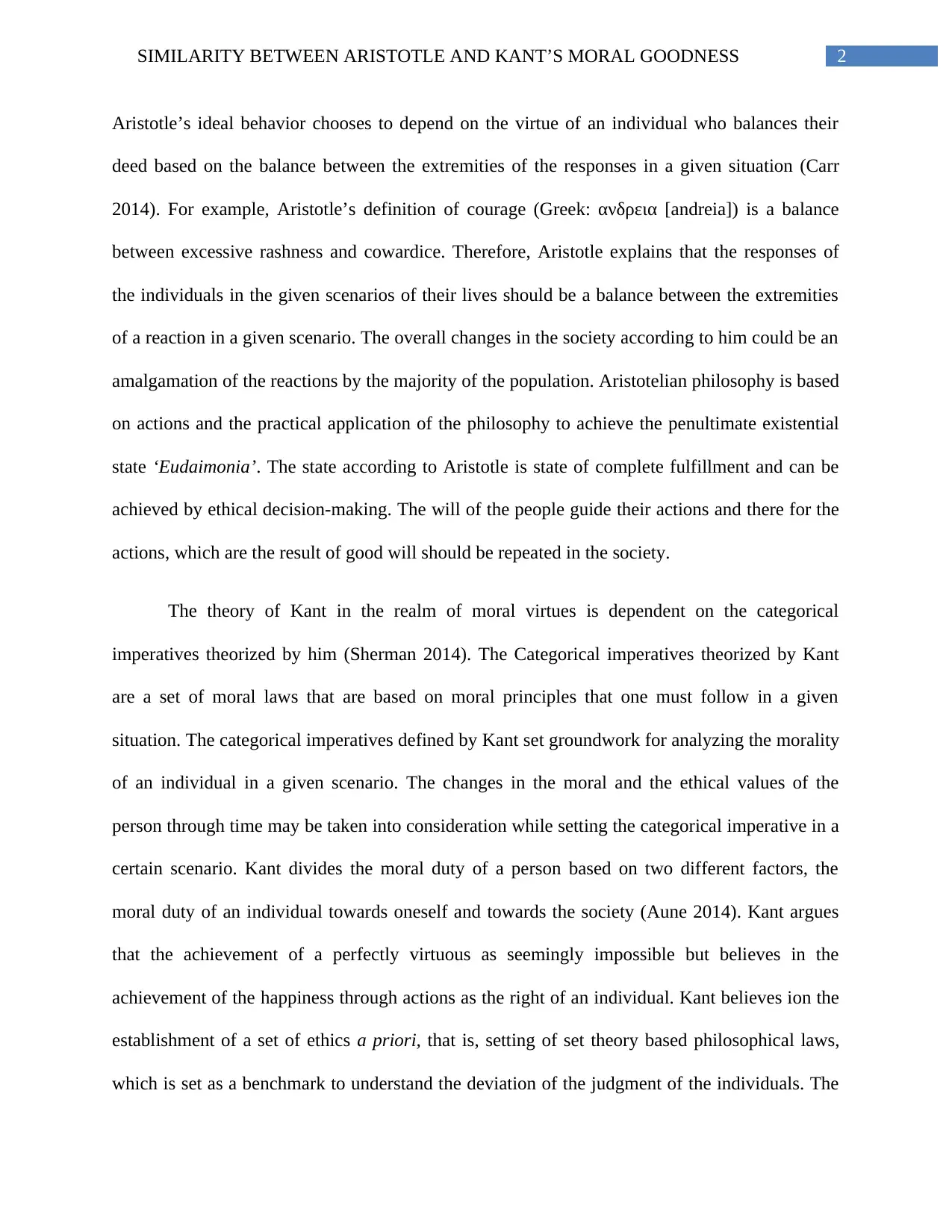
2SIMILARITY BETWEEN ARISTOTLE AND KANT’S MORAL GOODNESS
Aristotle’s ideal behavior chooses to depend on the virtue of an individual who balances their
deed based on the balance between the extremities of the responses in a given situation (Carr
2014). For example, Aristotle’s definition of courage (Greek: ανδρεια [andreia]) is a balance
between excessive rashness and cowardice. Therefore, Aristotle explains that the responses of
the individuals in the given scenarios of their lives should be a balance between the extremities
of a reaction in a given scenario. The overall changes in the society according to him could be an
amalgamation of the reactions by the majority of the population. Aristotelian philosophy is based
on actions and the practical application of the philosophy to achieve the penultimate existential
state ‘Eudaimonia’. The state according to Aristotle is state of complete fulfillment and can be
achieved by ethical decision-making. The will of the people guide their actions and there for the
actions, which are the result of good will should be repeated in the society.
The theory of Kant in the realm of moral virtues is dependent on the categorical
imperatives theorized by him (Sherman 2014). The Categorical imperatives theorized by Kant
are a set of moral laws that are based on moral principles that one must follow in a given
situation. The categorical imperatives defined by Kant set groundwork for analyzing the morality
of an individual in a given scenario. The changes in the moral and the ethical values of the
person through time may be taken into consideration while setting the categorical imperative in a
certain scenario. Kant divides the moral duty of a person based on two different factors, the
moral duty of an individual towards oneself and towards the society (Aune 2014). Kant argues
that the achievement of a perfectly virtuous as seemingly impossible but believes in the
achievement of the happiness through actions as the right of an individual. Kant believes ion the
establishment of a set of ethics a priori, that is, setting of set theory based philosophical laws,
which is set as a benchmark to understand the deviation of the judgment of the individuals. The
Aristotle’s ideal behavior chooses to depend on the virtue of an individual who balances their
deed based on the balance between the extremities of the responses in a given situation (Carr
2014). For example, Aristotle’s definition of courage (Greek: ανδρεια [andreia]) is a balance
between excessive rashness and cowardice. Therefore, Aristotle explains that the responses of
the individuals in the given scenarios of their lives should be a balance between the extremities
of a reaction in a given scenario. The overall changes in the society according to him could be an
amalgamation of the reactions by the majority of the population. Aristotelian philosophy is based
on actions and the practical application of the philosophy to achieve the penultimate existential
state ‘Eudaimonia’. The state according to Aristotle is state of complete fulfillment and can be
achieved by ethical decision-making. The will of the people guide their actions and there for the
actions, which are the result of good will should be repeated in the society.
The theory of Kant in the realm of moral virtues is dependent on the categorical
imperatives theorized by him (Sherman 2014). The Categorical imperatives theorized by Kant
are a set of moral laws that are based on moral principles that one must follow in a given
situation. The categorical imperatives defined by Kant set groundwork for analyzing the morality
of an individual in a given scenario. The changes in the moral and the ethical values of the
person through time may be taken into consideration while setting the categorical imperative in a
certain scenario. Kant divides the moral duty of a person based on two different factors, the
moral duty of an individual towards oneself and towards the society (Aune 2014). Kant argues
that the achievement of a perfectly virtuous as seemingly impossible but believes in the
achievement of the happiness through actions as the right of an individual. Kant believes ion the
establishment of a set of ethics a priori, that is, setting of set theory based philosophical laws,
which is set as a benchmark to understand the deviation of the judgment of the individuals. The
⊘ This is a preview!⊘
Do you want full access?
Subscribe today to unlock all pages.

Trusted by 1+ million students worldwide
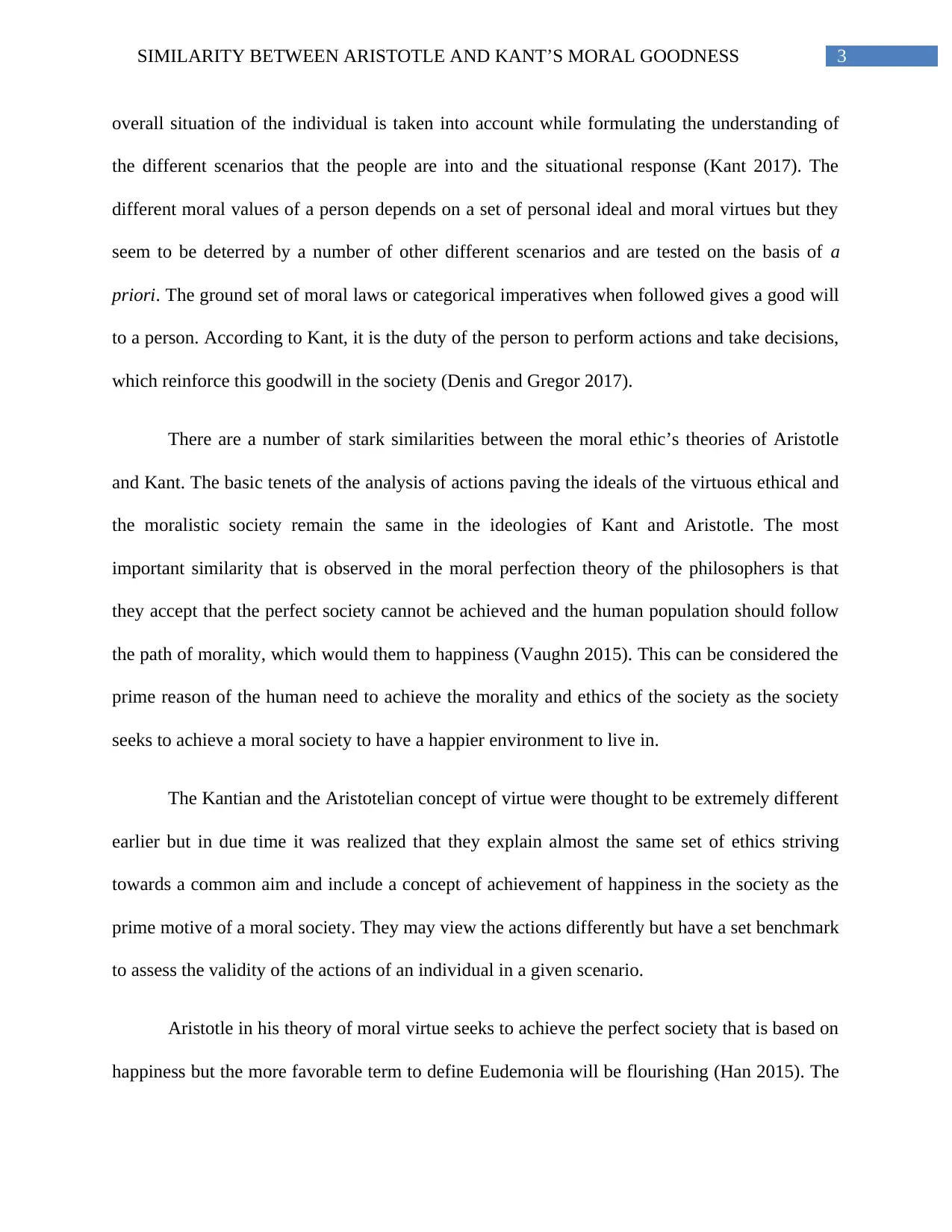
3SIMILARITY BETWEEN ARISTOTLE AND KANT’S MORAL GOODNESS
overall situation of the individual is taken into account while formulating the understanding of
the different scenarios that the people are into and the situational response (Kant 2017). The
different moral values of a person depends on a set of personal ideal and moral virtues but they
seem to be deterred by a number of other different scenarios and are tested on the basis of a
priori. The ground set of moral laws or categorical imperatives when followed gives a good will
to a person. According to Kant, it is the duty of the person to perform actions and take decisions,
which reinforce this goodwill in the society (Denis and Gregor 2017).
There are a number of stark similarities between the moral ethic’s theories of Aristotle
and Kant. The basic tenets of the analysis of actions paving the ideals of the virtuous ethical and
the moralistic society remain the same in the ideologies of Kant and Aristotle. The most
important similarity that is observed in the moral perfection theory of the philosophers is that
they accept that the perfect society cannot be achieved and the human population should follow
the path of morality, which would them to happiness (Vaughn 2015). This can be considered the
prime reason of the human need to achieve the morality and ethics of the society as the society
seeks to achieve a moral society to have a happier environment to live in.
The Kantian and the Aristotelian concept of virtue were thought to be extremely different
earlier but in due time it was realized that they explain almost the same set of ethics striving
towards a common aim and include a concept of achievement of happiness in the society as the
prime motive of a moral society. They may view the actions differently but have a set benchmark
to assess the validity of the actions of an individual in a given scenario.
Aristotle in his theory of moral virtue seeks to achieve the perfect society that is based on
happiness but the more favorable term to define Eudemonia will be flourishing (Han 2015). The
overall situation of the individual is taken into account while formulating the understanding of
the different scenarios that the people are into and the situational response (Kant 2017). The
different moral values of a person depends on a set of personal ideal and moral virtues but they
seem to be deterred by a number of other different scenarios and are tested on the basis of a
priori. The ground set of moral laws or categorical imperatives when followed gives a good will
to a person. According to Kant, it is the duty of the person to perform actions and take decisions,
which reinforce this goodwill in the society (Denis and Gregor 2017).
There are a number of stark similarities between the moral ethic’s theories of Aristotle
and Kant. The basic tenets of the analysis of actions paving the ideals of the virtuous ethical and
the moralistic society remain the same in the ideologies of Kant and Aristotle. The most
important similarity that is observed in the moral perfection theory of the philosophers is that
they accept that the perfect society cannot be achieved and the human population should follow
the path of morality, which would them to happiness (Vaughn 2015). This can be considered the
prime reason of the human need to achieve the morality and ethics of the society as the society
seeks to achieve a moral society to have a happier environment to live in.
The Kantian and the Aristotelian concept of virtue were thought to be extremely different
earlier but in due time it was realized that they explain almost the same set of ethics striving
towards a common aim and include a concept of achievement of happiness in the society as the
prime motive of a moral society. They may view the actions differently but have a set benchmark
to assess the validity of the actions of an individual in a given scenario.
Aristotle in his theory of moral virtue seeks to achieve the perfect society that is based on
happiness but the more favorable term to define Eudemonia will be flourishing (Han 2015). The
Paraphrase This Document
Need a fresh take? Get an instant paraphrase of this document with our AI Paraphraser
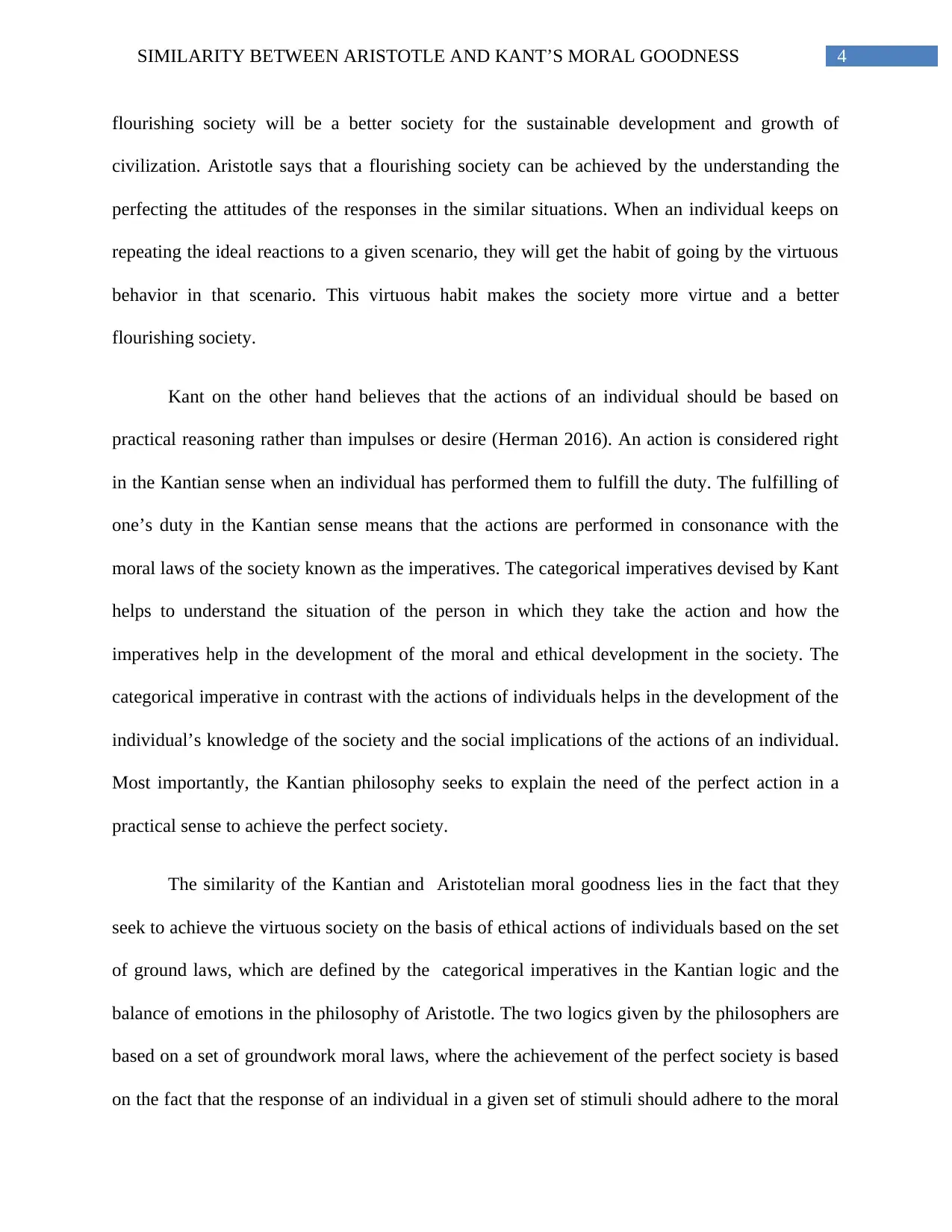
4SIMILARITY BETWEEN ARISTOTLE AND KANT’S MORAL GOODNESS
flourishing society will be a better society for the sustainable development and growth of
civilization. Aristotle says that a flourishing society can be achieved by the understanding the
perfecting the attitudes of the responses in the similar situations. When an individual keeps on
repeating the ideal reactions to a given scenario, they will get the habit of going by the virtuous
behavior in that scenario. This virtuous habit makes the society more virtue and a better
flourishing society.
Kant on the other hand believes that the actions of an individual should be based on
practical reasoning rather than impulses or desire (Herman 2016). An action is considered right
in the Kantian sense when an individual has performed them to fulfill the duty. The fulfilling of
one’s duty in the Kantian sense means that the actions are performed in consonance with the
moral laws of the society known as the imperatives. The categorical imperatives devised by Kant
helps to understand the situation of the person in which they take the action and how the
imperatives help in the development of the moral and ethical development in the society. The
categorical imperative in contrast with the actions of individuals helps in the development of the
individual’s knowledge of the society and the social implications of the actions of an individual.
Most importantly, the Kantian philosophy seeks to explain the need of the perfect action in a
practical sense to achieve the perfect society.
The similarity of the Kantian and Aristotelian moral goodness lies in the fact that they
seek to achieve the virtuous society on the basis of ethical actions of individuals based on the set
of ground laws, which are defined by the categorical imperatives in the Kantian logic and the
balance of emotions in the philosophy of Aristotle. The two logics given by the philosophers are
based on a set of groundwork moral laws, where the achievement of the perfect society is based
on the fact that the response of an individual in a given set of stimuli should adhere to the moral
flourishing society will be a better society for the sustainable development and growth of
civilization. Aristotle says that a flourishing society can be achieved by the understanding the
perfecting the attitudes of the responses in the similar situations. When an individual keeps on
repeating the ideal reactions to a given scenario, they will get the habit of going by the virtuous
behavior in that scenario. This virtuous habit makes the society more virtue and a better
flourishing society.
Kant on the other hand believes that the actions of an individual should be based on
practical reasoning rather than impulses or desire (Herman 2016). An action is considered right
in the Kantian sense when an individual has performed them to fulfill the duty. The fulfilling of
one’s duty in the Kantian sense means that the actions are performed in consonance with the
moral laws of the society known as the imperatives. The categorical imperatives devised by Kant
helps to understand the situation of the person in which they take the action and how the
imperatives help in the development of the moral and ethical development in the society. The
categorical imperative in contrast with the actions of individuals helps in the development of the
individual’s knowledge of the society and the social implications of the actions of an individual.
Most importantly, the Kantian philosophy seeks to explain the need of the perfect action in a
practical sense to achieve the perfect society.
The similarity of the Kantian and Aristotelian moral goodness lies in the fact that they
seek to achieve the virtuous society on the basis of ethical actions of individuals based on the set
of ground laws, which are defined by the categorical imperatives in the Kantian logic and the
balance of emotions in the philosophy of Aristotle. The two logics given by the philosophers are
based on a set of groundwork moral laws, where the achievement of the perfect society is based
on the fact that the response of an individual in a given set of stimuli should adhere to the moral
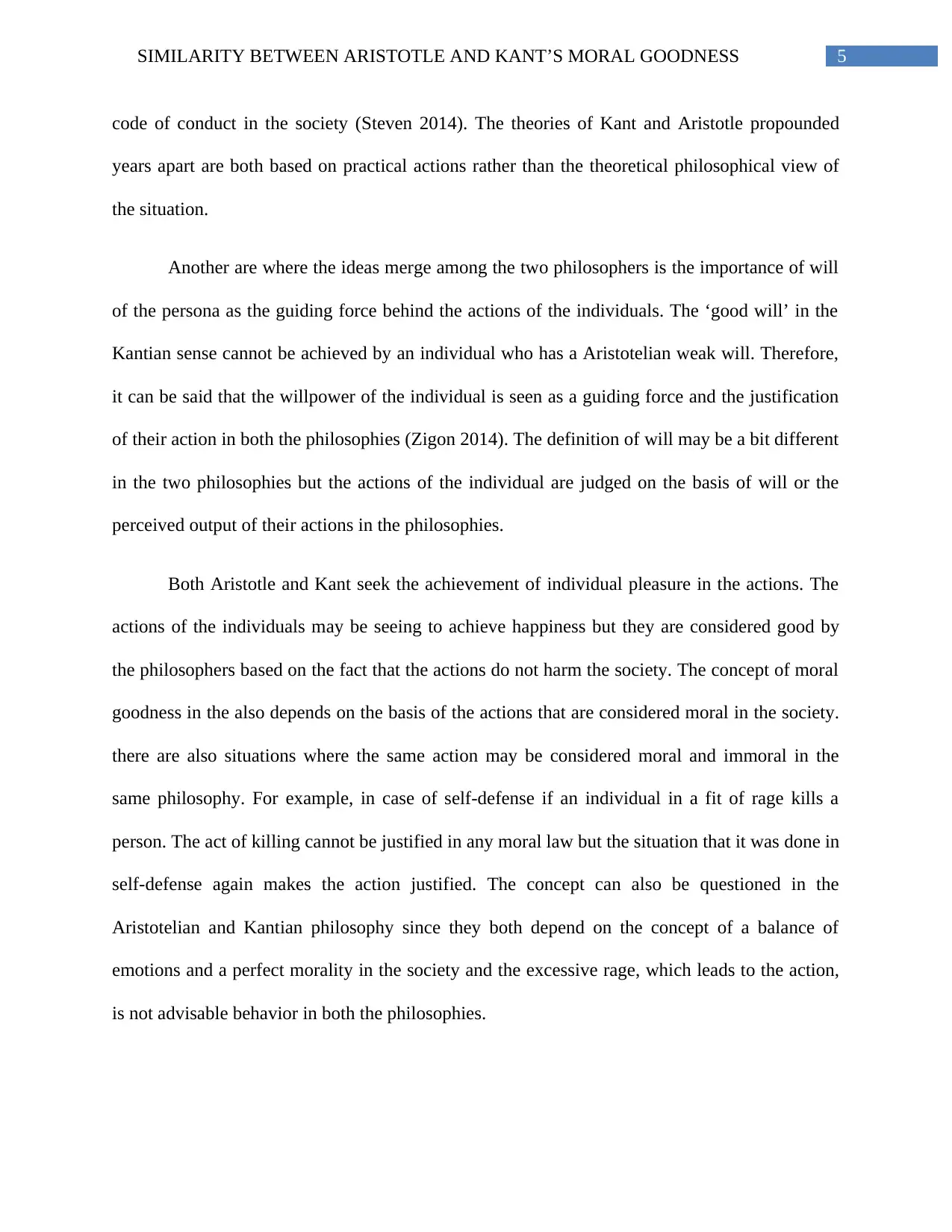
5SIMILARITY BETWEEN ARISTOTLE AND KANT’S MORAL GOODNESS
code of conduct in the society (Steven 2014). The theories of Kant and Aristotle propounded
years apart are both based on practical actions rather than the theoretical philosophical view of
the situation.
Another are where the ideas merge among the two philosophers is the importance of will
of the persona as the guiding force behind the actions of the individuals. The ‘good will’ in the
Kantian sense cannot be achieved by an individual who has a Aristotelian weak will. Therefore,
it can be said that the willpower of the individual is seen as a guiding force and the justification
of their action in both the philosophies (Zigon 2014). The definition of will may be a bit different
in the two philosophies but the actions of the individual are judged on the basis of will or the
perceived output of their actions in the philosophies.
Both Aristotle and Kant seek the achievement of individual pleasure in the actions. The
actions of the individuals may be seeing to achieve happiness but they are considered good by
the philosophers based on the fact that the actions do not harm the society. The concept of moral
goodness in the also depends on the basis of the actions that are considered moral in the society.
there are also situations where the same action may be considered moral and immoral in the
same philosophy. For example, in case of self-defense if an individual in a fit of rage kills a
person. The act of killing cannot be justified in any moral law but the situation that it was done in
self-defense again makes the action justified. The concept can also be questioned in the
Aristotelian and Kantian philosophy since they both depend on the concept of a balance of
emotions and a perfect morality in the society and the excessive rage, which leads to the action,
is not advisable behavior in both the philosophies.
code of conduct in the society (Steven 2014). The theories of Kant and Aristotle propounded
years apart are both based on practical actions rather than the theoretical philosophical view of
the situation.
Another are where the ideas merge among the two philosophers is the importance of will
of the persona as the guiding force behind the actions of the individuals. The ‘good will’ in the
Kantian sense cannot be achieved by an individual who has a Aristotelian weak will. Therefore,
it can be said that the willpower of the individual is seen as a guiding force and the justification
of their action in both the philosophies (Zigon 2014). The definition of will may be a bit different
in the two philosophies but the actions of the individual are judged on the basis of will or the
perceived output of their actions in the philosophies.
Both Aristotle and Kant seek the achievement of individual pleasure in the actions. The
actions of the individuals may be seeing to achieve happiness but they are considered good by
the philosophers based on the fact that the actions do not harm the society. The concept of moral
goodness in the also depends on the basis of the actions that are considered moral in the society.
there are also situations where the same action may be considered moral and immoral in the
same philosophy. For example, in case of self-defense if an individual in a fit of rage kills a
person. The act of killing cannot be justified in any moral law but the situation that it was done in
self-defense again makes the action justified. The concept can also be questioned in the
Aristotelian and Kantian philosophy since they both depend on the concept of a balance of
emotions and a perfect morality in the society and the excessive rage, which leads to the action,
is not advisable behavior in both the philosophies.
⊘ This is a preview!⊘
Do you want full access?
Subscribe today to unlock all pages.

Trusted by 1+ million students worldwide
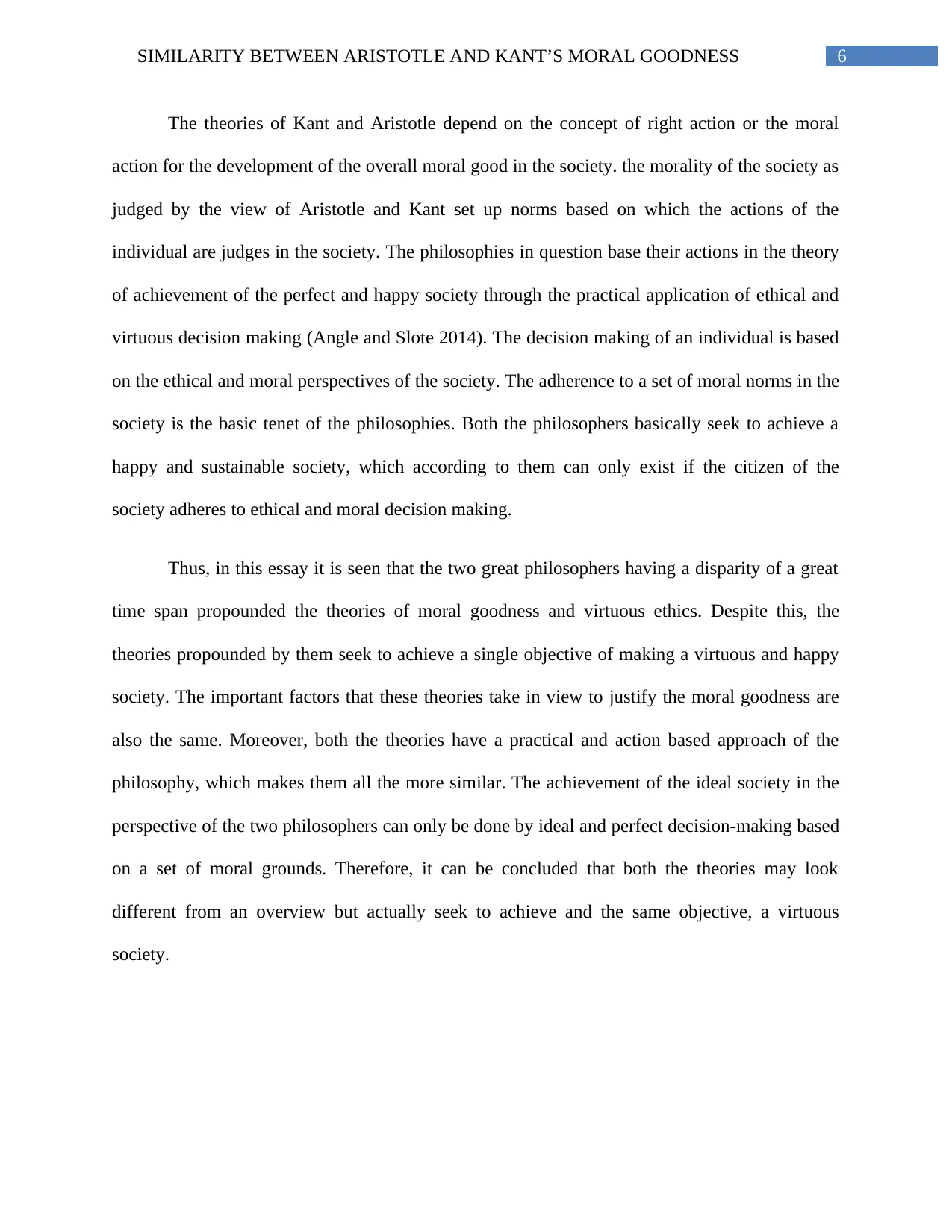
6SIMILARITY BETWEEN ARISTOTLE AND KANT’S MORAL GOODNESS
The theories of Kant and Aristotle depend on the concept of right action or the moral
action for the development of the overall moral good in the society. the morality of the society as
judged by the view of Aristotle and Kant set up norms based on which the actions of the
individual are judges in the society. The philosophies in question base their actions in the theory
of achievement of the perfect and happy society through the practical application of ethical and
virtuous decision making (Angle and Slote 2014). The decision making of an individual is based
on the ethical and moral perspectives of the society. The adherence to a set of moral norms in the
society is the basic tenet of the philosophies. Both the philosophers basically seek to achieve a
happy and sustainable society, which according to them can only exist if the citizen of the
society adheres to ethical and moral decision making.
Thus, in this essay it is seen that the two great philosophers having a disparity of a great
time span propounded the theories of moral goodness and virtuous ethics. Despite this, the
theories propounded by them seek to achieve a single objective of making a virtuous and happy
society. The important factors that these theories take in view to justify the moral goodness are
also the same. Moreover, both the theories have a practical and action based approach of the
philosophy, which makes them all the more similar. The achievement of the ideal society in the
perspective of the two philosophers can only be done by ideal and perfect decision-making based
on a set of moral grounds. Therefore, it can be concluded that both the theories may look
different from an overview but actually seek to achieve and the same objective, a virtuous
society.
The theories of Kant and Aristotle depend on the concept of right action or the moral
action for the development of the overall moral good in the society. the morality of the society as
judged by the view of Aristotle and Kant set up norms based on which the actions of the
individual are judges in the society. The philosophies in question base their actions in the theory
of achievement of the perfect and happy society through the practical application of ethical and
virtuous decision making (Angle and Slote 2014). The decision making of an individual is based
on the ethical and moral perspectives of the society. The adherence to a set of moral norms in the
society is the basic tenet of the philosophies. Both the philosophers basically seek to achieve a
happy and sustainable society, which according to them can only exist if the citizen of the
society adheres to ethical and moral decision making.
Thus, in this essay it is seen that the two great philosophers having a disparity of a great
time span propounded the theories of moral goodness and virtuous ethics. Despite this, the
theories propounded by them seek to achieve a single objective of making a virtuous and happy
society. The important factors that these theories take in view to justify the moral goodness are
also the same. Moreover, both the theories have a practical and action based approach of the
philosophy, which makes them all the more similar. The achievement of the ideal society in the
perspective of the two philosophers can only be done by ideal and perfect decision-making based
on a set of moral grounds. Therefore, it can be concluded that both the theories may look
different from an overview but actually seek to achieve and the same objective, a virtuous
society.
Paraphrase This Document
Need a fresh take? Get an instant paraphrase of this document with our AI Paraphraser
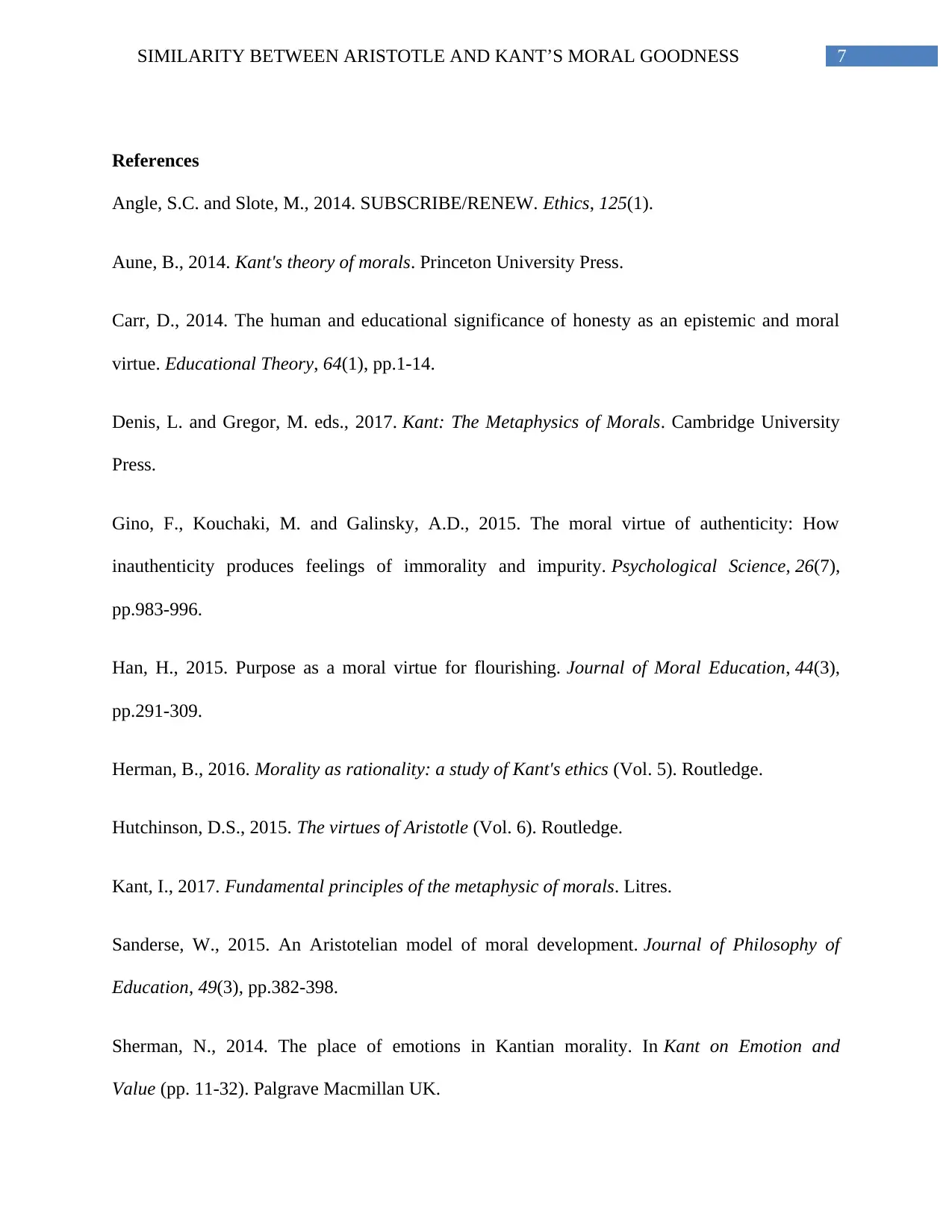
7SIMILARITY BETWEEN ARISTOTLE AND KANT’S MORAL GOODNESS
References
Angle, S.C. and Slote, M., 2014. SUBSCRIBE/RENEW. Ethics, 125(1).
Aune, B., 2014. Kant's theory of morals. Princeton University Press.
Carr, D., 2014. The human and educational significance of honesty as an epistemic and moral
virtue. Educational Theory, 64(1), pp.1-14.
Denis, L. and Gregor, M. eds., 2017. Kant: The Metaphysics of Morals. Cambridge University
Press.
Gino, F., Kouchaki, M. and Galinsky, A.D., 2015. The moral virtue of authenticity: How
inauthenticity produces feelings of immorality and impurity. Psychological Science, 26(7),
pp.983-996.
Han, H., 2015. Purpose as a moral virtue for flourishing. Journal of Moral Education, 44(3),
pp.291-309.
Herman, B., 2016. Morality as rationality: a study of Kant's ethics (Vol. 5). Routledge.
Hutchinson, D.S., 2015. The virtues of Aristotle (Vol. 6). Routledge.
Kant, I., 2017. Fundamental principles of the metaphysic of morals. Litres.
Sanderse, W., 2015. An Aristotelian model of moral development. Journal of Philosophy of
Education, 49(3), pp.382-398.
Sherman, N., 2014. The place of emotions in Kantian morality. In Kant on Emotion and
Value (pp. 11-32). Palgrave Macmillan UK.
References
Angle, S.C. and Slote, M., 2014. SUBSCRIBE/RENEW. Ethics, 125(1).
Aune, B., 2014. Kant's theory of morals. Princeton University Press.
Carr, D., 2014. The human and educational significance of honesty as an epistemic and moral
virtue. Educational Theory, 64(1), pp.1-14.
Denis, L. and Gregor, M. eds., 2017. Kant: The Metaphysics of Morals. Cambridge University
Press.
Gino, F., Kouchaki, M. and Galinsky, A.D., 2015. The moral virtue of authenticity: How
inauthenticity produces feelings of immorality and impurity. Psychological Science, 26(7),
pp.983-996.
Han, H., 2015. Purpose as a moral virtue for flourishing. Journal of Moral Education, 44(3),
pp.291-309.
Herman, B., 2016. Morality as rationality: a study of Kant's ethics (Vol. 5). Routledge.
Hutchinson, D.S., 2015. The virtues of Aristotle (Vol. 6). Routledge.
Kant, I., 2017. Fundamental principles of the metaphysic of morals. Litres.
Sanderse, W., 2015. An Aristotelian model of moral development. Journal of Philosophy of
Education, 49(3), pp.382-398.
Sherman, N., 2014. The place of emotions in Kantian morality. In Kant on Emotion and
Value (pp. 11-32). Palgrave Macmillan UK.
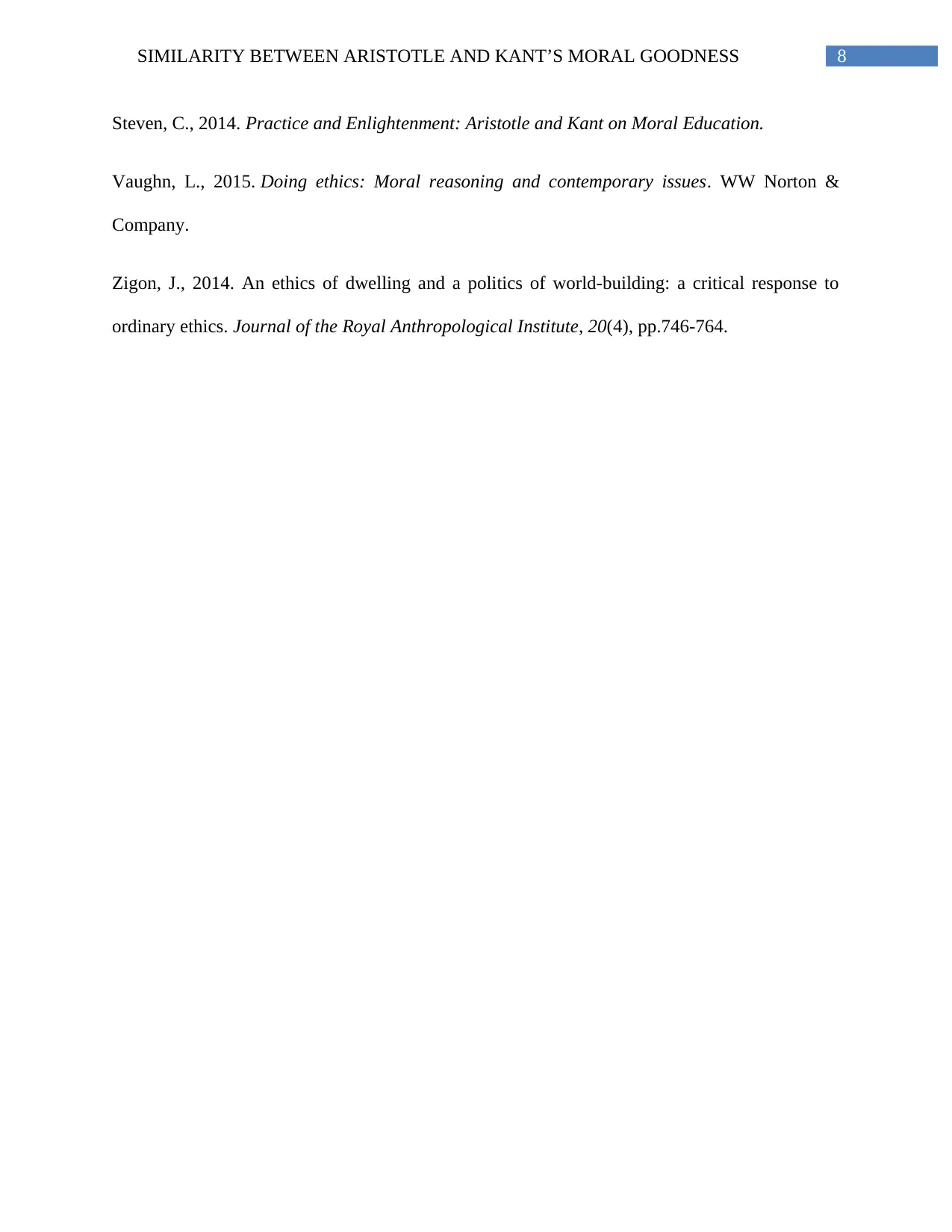
8SIMILARITY BETWEEN ARISTOTLE AND KANT’S MORAL GOODNESS
Steven, C., 2014. Practice and Enlightenment: Aristotle and Kant on Moral Education.
Vaughn, L., 2015. Doing ethics: Moral reasoning and contemporary issues. WW Norton &
Company.
Zigon, J., 2014. An ethics of dwelling and a politics of world‐building: a critical response to
ordinary ethics. Journal of the Royal Anthropological Institute, 20(4), pp.746-764.
Steven, C., 2014. Practice and Enlightenment: Aristotle and Kant on Moral Education.
Vaughn, L., 2015. Doing ethics: Moral reasoning and contemporary issues. WW Norton &
Company.
Zigon, J., 2014. An ethics of dwelling and a politics of world‐building: a critical response to
ordinary ethics. Journal of the Royal Anthropological Institute, 20(4), pp.746-764.
⊘ This is a preview!⊘
Do you want full access?
Subscribe today to unlock all pages.

Trusted by 1+ million students worldwide
1 out of 9
Related Documents
Your All-in-One AI-Powered Toolkit for Academic Success.
+13062052269
info@desklib.com
Available 24*7 on WhatsApp / Email
![[object Object]](/_next/static/media/star-bottom.7253800d.svg)
Unlock your academic potential
Copyright © 2020–2026 A2Z Services. All Rights Reserved. Developed and managed by ZUCOL.





